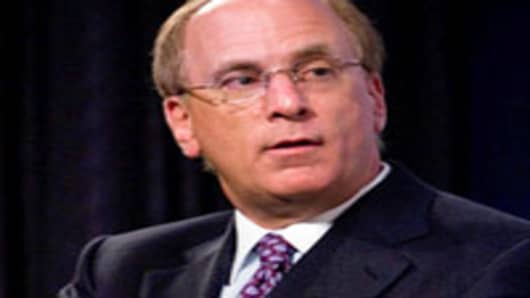It wasn’t just that he was touting the merits of liquid bond ETFs over illiquid bonds (more about that in a second). Instead it was the astounding example he used — how one Blackrock client went from owning 4,000 individual bonds to owning just six bond ETFs. (Read More:BlackRock to Lower Fees on Certain ETFs: CEO.)
Talking about how difficult it has become to trade bonds, Fink said: “We have a large client who is complaining. They had 4,000 items of fixed income securities in their portfolio ... It’s very hard now to navigate the fixed income market — it is so illiquid right now. (Read More: Slideshow -8 Weirdest ETFs.)
“So our team came to this client, very large pension plan, and we talked to them about, “Have you thought about giving us all your 4,000 securities and we will deliver you six different ETFs in fixed income?”
“And that’s what we did. So instead of having 4,000 items this client now has six ETFs and now they are tactically trading different ETFs. One of them can be an emerging markets ETF in fixed income, one can be credit, one maybe government — and this client is moving around tactically and the client is saving money related to line items [and] doesn’t have 4,000 to worry about. The client has six products.
“And I believe this is going to transform the fixed income market, as more and more clients are going to say: I can’t make it. And if this happens we are going to see the whole fixed income market to be transformed more.”
Which on one level makes a ton of sense, but it also raises a ton of questions, such as:
What are the unintended consequences? If most big funds start buying the ETFs instead of the bonds, what does that do to the mechanics of the bond market? Or the desire of companies to use bonds to raise cash? What happens to credit analysis?
And while it may be simpler to tactically trade just a few ETFs rather than research the underlying bonds, does the greater concentration create greater risks? Or will it create a market of mediocrity? (Read More:Inside the Complex World of Computer-Driven Stock Trading.)
And what about trying to magically create liquidity out of illiquidity? That’s been one of the biggest concerns of ETF critics.
Here’s what I know: Nobody knows, but I also know nothing is that easy. There’s always a tradeoff. As in all cases, this one won’t be obvious until after the fact.
Questions? Comments? Write to HerbOnTheStreet@cnbc.com
Follow Herb on Twitter: @herbgreenberg
Find Herb on Google+
Subscribe to Herb athttp://www.facebook.com/herb.greenberg
Disclaimer



